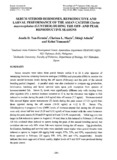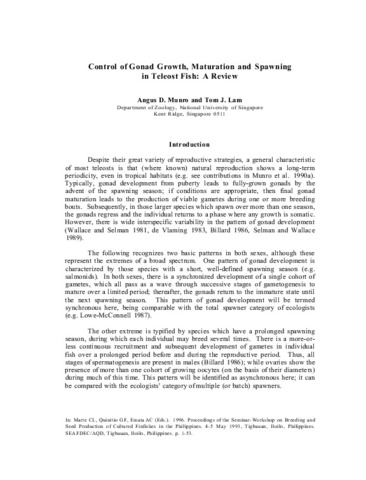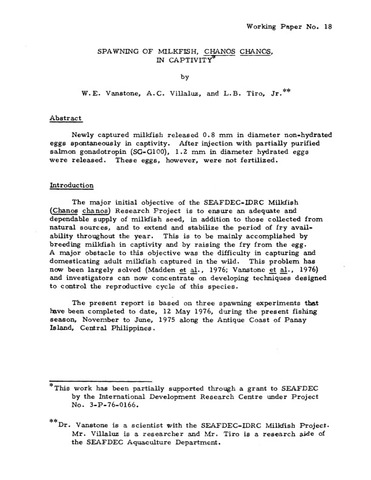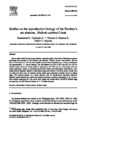Serum steroid hormones, reproductive and larval performance of the Asian catfish Clarias macrocephalus (Gunther) during the off- and peak reproductive seasons
Share
abstrak
Serum samples were taken from gravid female catfish 0 to 24 h after injection of luteinizing hormone releasing hormone analogue (LHRHa) and pimozide (PIM) to monitor the serum steroid hormone levels during the off seasons (February) and the peak of the natural breeding period (August). A parallel study was also conducted to compare egg production, fertilization, hachuring and larval rates upon yolk resorption from spawn’s of hormone-treated fish. Serum E2 levels were significantly different only with varying times after injection (PI); a marked increase occurred at 13 h, but the elevation was higher in fish induced to ovulate during the peak (16.8 ng/ml) than off season(7.7ng/ml). Hormone-treated fish showed higher serum testosterone (T) levels during the peak season (17-23 ng/ml) than those injected during the off season (10-20 ng/ml) at 4-12 h PI. Serum 17¤, 20ß-dihydroxy-4-pregnene-3-one (DHP) levels og hormone-treated fish during the off season were only about half the level (0.29 and 0.52ng/ml) of those treated with the same hormones during the peak season (0.54 and 0.9 ng/ml) at 8 and 12 h PI, respectively. Initial eggs size was larger in fish induced to spawn in August (1.54 mm) than in fish induced in February (1.49 mm). All fish ovulated when induced to spawn during the peak of the natural breeding period, but ovulation rate was only 60% when were injected during the off season. Egg production, fertilization, hatchery and survival rates were similarly much higher when gravid females were induced to spawn in August (88 eggs/g body weight, 97%, 73%, and 95%, respectively) than those spawned in February (20 eggs/g BW,36%, 20%, and 47%, respectively). Results indicate that more eggs and of better quality, higher levels of T and DHP were produced during the peak season.
Suggested Citation
Tan-Fermin, J. D., Marte, C. L., Adachi, S., & Yamauchi, K. (2001). Serum steroid hormones, reproductive and larval performance of the Asian catfish Clarias macrocephalus (Gunther) during the off- and peak reproductive seasons. In J. Y.-L. Yu (Ed.), Recent Advances in Comparative Endocrinology. Proceedings of the Fourth Congress of the Asia and Oceana Society for Comparative Endocrinology, May 14-18, 2000, Academia Sinica, Taipei, Taiwan, R.O.C. (pp. 288–297). Taipei, Taiwan, R.O.C.: Institute of Zoology, Academia Sinica.
Subjek
Koleksi
Related items
Showing items related by title, author, creator and subject.
-
Control of gonad growth, maturation and spawning in teleost fish: A review
Munro, Angus D.; Lam, Tom J. (Aquaculture Department, Southeast Asian Fisheries Development Center, 1996)Despite their great variety of reproductive strategies, a general characteristic of most teleosts is that (where known) natural reproduction shows a long-term periodicity, even in tropical habitats (e.g. see contributions ... -
Spawning of milkfish, Chanos chanos, in captivity
Vanstone, William E.; Villaluz, Antonio C.; Tiro Jr., Leonardo B. (Aquaculture Department, Southeast Asian Fisheries Development Center, 1976)Newly captured milkfish released 0.8 mm in diameter non-hydrated eggs spontaneously in captivity. After injection with partially purified salmon gonadotropin (SG-G100), 1.2 mm in diameter hydrated eggs were released. These ... -
Studies on the reproductive biology of the Donkey's ear abalone, Haliotis asinina Linné
Capinpin, Emmanuel C., Jr.; Encena II, Vincent C.; Bayona, Nestor C. (Elsevier, 1998)The sex ratio, initial size at sexual maturity, spawning period, time interval between successive spawnings and fecundity of the Donkey's ear abalone, Haliotis asinina were studied. The sex ratio of wild abalone (>60 ...





